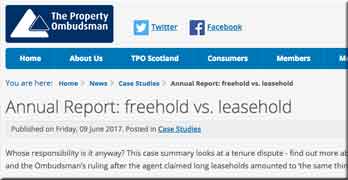Annual Report: freehold vs. leasehold
Whose responsibility is it anyway? This case summary looks at a tenure dispute – find out more about the complaint and the Ombudsman’s ruling after the agent claimed long leaseholds amounted to ‘the same thing’ as freehold. The buyer in this case explained that they told the agent that they wanted to purchase a freehold property.
 LKP has stopped developers misleading buyers by claiming in marketing materials that long leases are “virtually freehold” – with both McCarthy and Stone and Persimmon ceasing the practice.
LKP has stopped developers misleading buyers by claiming in marketing materials that long leases are “virtually freehold” – with both McCarthy and Stone and Persimmon ceasing the practice.
It emerges that The Property Ombudsman has also ruled on a case in June, directing the sales agent (which possibly means a developer) return £1,100 in legal and survey fees and an additional award of £200.
LKP urges all readers who encounter this nonsense to raise complaints with both the relevant ombudsman service and the Advertising Standards Authority.
It is deeply misleading to argue that a long lease of say 999 years is “virtually freehold”: a leasehold is a tenancy; a freehold is something else entirely.
Of course, The Property Ombudsman award of £200 is pathetic and the agent / developer involved in this deception is unnamed, so the ruling is toothless.
When ARMA set up its regulatory regime it was always strongly emphasised that the rulings would be published.
LKP supported the trade body for taking this step.
The resignation of Sally Keeble as regulator discontinues that role and she will not be replaced.
Passing all complaints on to the anonymous ombudsmen process effectively means the end of ARMA’s efforts at self-regulation.
That is a realistic decision given that many of the companies that make up its membership are not entirely savoury, and some are out-and-out rotters. (We have repeatedly warned ARMA about some of them.)
Politicians and civil servants need to understand: there is not one large managing agent out there that is large through consumer choice.
All the large managing agents, without exception, have got large by doing the bidding of developers or the larger freehold owners.
Should leaseholders care whether a company is a member of ARMA at all?
It demonstrates some engagement with the well regarded technical information and education for the profession. For a large block of flats, it would be exceptional for a managing agent not to be a member of ARMA.
But as a guarantee of good ethical behaviour it is irrelevant.
If you are looking for a managing agent with a track record of working for leaseholder-controlled sites, then you can start by considering a management company that is accredited to LKP.





 More farce than Blackadder’s court martial: ARMA claims its regulator ‘retired’
More farce than Blackadder’s court martial: ARMA claims its regulator ‘retired’






















It is good that M&S have ceased to call 999 year leases “virtually freehold”.
But they still persist in calling the residents Homeowners., which is just as misleading.
It is also misleading to have LEASEHOLDS featured under “Sales” (property websites)
Leaseholds are TENANCIES under the Lease;
can everyone please complain to Advertising Standards Authority to say:
1-Leaseholds are toxic; People don’t want them
2-ask the A.S.A to ensure Leaseholds are clearly visible on websites such as zoopla, rightmove and ALL estate agents websites and window display actually
their website is: www. asa.org.uk
FOR THE RECORD
Please find below letter I sent today to the Property Ombudsman and the Advertising Standards Authority:
E: £200 award (not reflecting prejudice) and costing £thousands to investigate
Dear Sirs, Dear Madam,
News has emerged today that The Property Ombudsman has ruled on a case in June, ordering the sales agent (which possibly means a developer) return £1,100 in legal and survey fees and an additional award of £200. on a residential conveyancing/sale matter.
Does the TPO Leadership realise how serious the long-term financial consequences of the false “virtual freehold” claim are on families/households?
There is no such thing as “virtual freehold”;
Either a residential property is freehold or leasehold (which is nothing more than a glorified tenancy btw, despite mortgage leaseholds have on it);
What s more, Under lease terms of residential leases and under the legislation leaseholders are “tenants”.
I urge the Advertising Standards Authority to:
1-clamp down (not tokenistic fines) on this practice with fines that would act as deterrents.
2-ensure property websites advertise (zoopla and co) leasehold properties under their lettings/tenancies section;
I urge the TPO to offer awards that reflect the gravity of the prejudice
Access to justice in this country is now unafordable to most.
Taxpayers often rely on Ombudsman and redress schemes as their only hope for justice;
If awards and compensations by the TPOS or ASA are interpreted by profit-making estate agents and developers as:
“we can get away with our behaviour /misrepresentation because we will be able to afford their fine anyway”
Will you have achieved the aims of your organisation.
Yours,
C.L
“Help To Buy” is miss leading.
It has miss lead thousands into thinking they r buying their home when we now realise we are simply tenants for the duration of the lease. This needs to be addressed.
How can they get away with this?
Help to Buy has been the underlying cause of many of the issues. H2B has allowed developers to see massive rises in profits and nice generous bonuses.
H2B has lurred people into thinking they r buying their homes.
H2B is the biggest pull factor when selling a new build property.
Government MUST take ŕesponsibility for what they have created .
And let us not forget the business model operated by the Ground Rent companies as pioneered by Vincent Tchenguiz?
He would buy up the freeholds, and effectively appoint himself (via connected companies) as the managing agent. The profits made by the managing agent could find a way of being transferred to the offshore Tchenguiz coffers(possibly by way of a loan that never needs to be paid back)
These “profits” can be used to pay the loans secured to purchase the freeholds in the first place.
Even more remarkable were the valuations and terms put on the loans.
Not only was the future ground rent income included, but future income from granting permissions, administration charges, lease extensions commissions for insurance, exit fees (now called event fees)
And unbelievable as it was to the market at the time, loans were granted over a 150 year term.
As the Tchenguiz property portfolio gradually gets sold off, the new backers (Rothesay Life) have kept many of the previous valuations but the mortgage term has been reduced to a mere 85 years.
And that dear victimised and exploited leaseholder is the freeholding companies week point?
The freeholders have enhanced valuations which include the value of future income derived from services in addition to the core property valuation, which they have secured long term loans.
If we can reduce their income (let’s aim for 20% to begin with) they are heading for trouble.
The challenge to Peverel/Firstport proved it can be done!
Charter Quay went several steps further!
Not only did they rid themselves of Tchenguiz connected managing agents (putting a dent in the managing agents profits and thereby reducing Tchenguiz income) they purchased the freehold as well. Instead of the Tchenguiz valuation of around £3.2 m, I believe Charter Quay paid around £900,000.
Remember the higher valuations were borrowed against?
So, if leaseholders only manage to purchase the freeholds at 60% of the freeholder’s valuation as opposed to the brilliant Charter Quays around 30% (and don’t forget leaseholders have the legal right to do this) you can see the freeholder’s business model collapses.